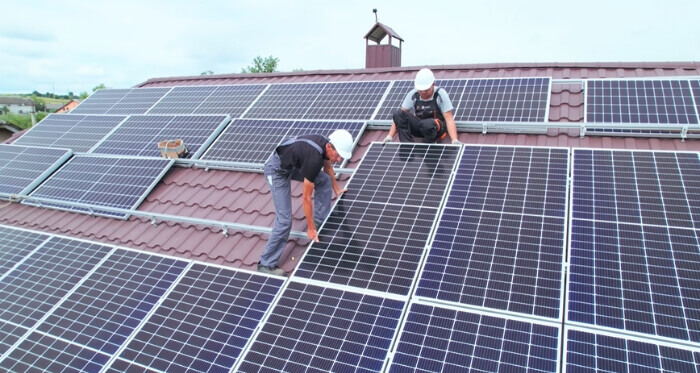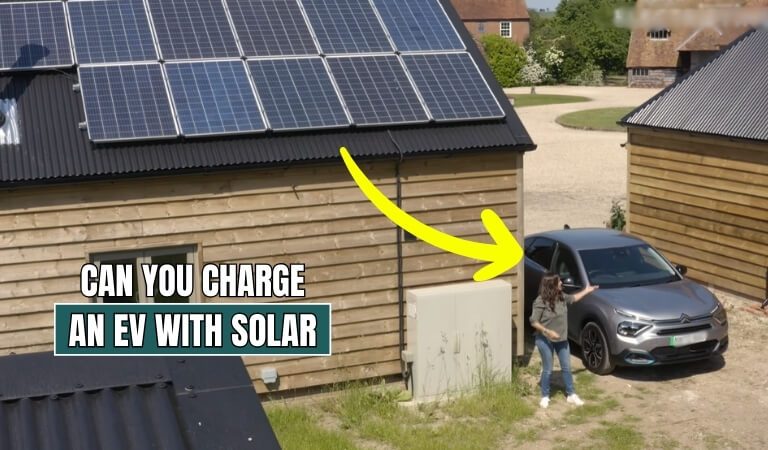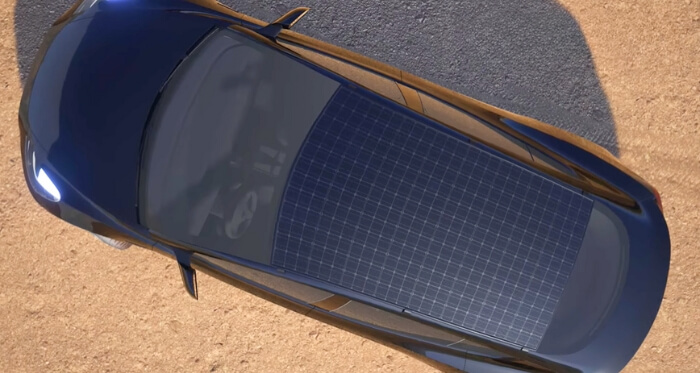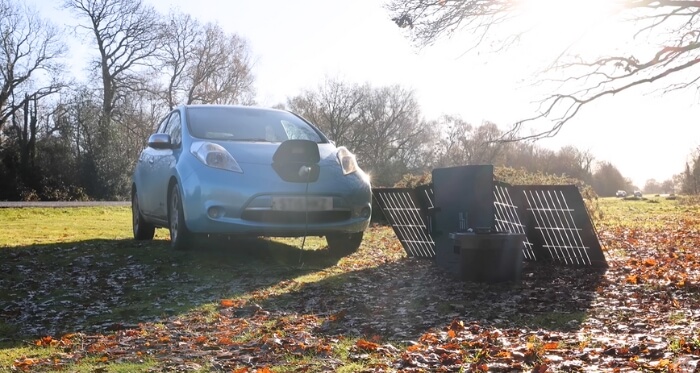Introducing the revolutionary electric vehicle (EV), a symbol of sustainable transportation and the future of mobility. As our world revolves towards eco-conscious solutions, EVs have emerged as a cornerstone of this movement, offering emissions-free travel powered by electricity.
These are successful inventions to decrease the use of fossil fuels, and in the past decade, they have become a primary vehicle in various countries. But among the buzz surrounding these vehicles, a common question arises: Can you charge an EV with solar power?
Yes, you can. As solar panels convert the sun’s renewable energy into electricity, this process will charge your EV. But there are a few factors and calculations of daily driving range and energy consumption you must understand to get sufficient energy to charge your EV from the solar panels.
Here, we dive deeper into the symbiotic relationship between solar energy and electric vehicles, exploring the feasibility, benefits, and considerations of this eco-friendly charging solution.
Also, find out all the mechanisms by which you can charge your EV with solar power. Let’s dig in!
What Is Solar Power?
Initially, grasp what solar power is. Solar power is a remarkable form of renewable energy received from the sun’s abundant light and heat. It involves harnessing the sun’s energy through specially designed solar panels, often found on rooftops or in dedicated solar farms. These panels are equipped with photovoltaic cells, which act as the workhorses of solar power generation.

When sunlight strikes these photovoltaic cells, it triggers an appealing process. These cells contain semiconductors, usually made of silicon, which absorb the energy from the sunlight. As a result, electrons within the semiconductor become excited and start moving, generating an electric current.
This direct current (DC) is then transformed into the alternating current (AC) used in our homes and businesses by passing through an inverter. Utilizing solar power produces no harmful emissions, perfect for a cleaner and healthier planet.
Can You Charge an EV With Solar?
The notion of charging an EV with solar power is an increasingly popular and green approach in today’s society. Unlike traditional vehicles relying on fossil fuels, EVs operate solely on electrical power. This leads to the natural question: Can you charge an EV with solar?

EV charging with solar power is possible, and it has become an ideal charging option in many countries. The process involves tapping into the sun’s energy using solar panels. These panels, commonly mounted on your rooftops or dedicated structures, tackle sunlight through photovoltaic cells.
When sunlight hits these cells, it triggers a magical transformation, which is basically the conversion of sunlight into electricity. This electricity is then directed to charge the EV’s battery, providing a clean and sustainable power source for your electric vehicle.
Interestingly, CrackPlatoon Charging Solution Limited offers a broad EV charging infrastructure tailored to Bangladesh’s evolving landscape. Their network of EV charging stations ensures seamless travel within cities and highways, alleviating range anxiety for EV owners.
With professional installation services and a user-friendly EV charge app, we prioritize convenience and accessibility. Our OCPP-based cloud management system facilitates real-time monitoring and efficient operation of charging points, enhancing user experience.
Emphasizing high-quality products and 24/7 support, they supply to diverse usage scenarios from offices to motels. While both solar and conventional charging systems have merits, our focus remains on delivering reliable, cost-effective solutions to meet Bangladesh’s growing EV charging needs.
So, in a general sense, you can easily charge your EV with solar energy. But there are some minor aspects you must learn to get a sufficient amount of charging that is fine to fulfill your daily driving range.
Calculating the Power of the Solar Energy that EVs Needs
Although solar energy is renewable, it has a limit on how much it can generate each day as the sun doesn’t shine all day long. There is an easy way to calculate how much-fixed energy your EV will need from solar panels.
First, know the below things before calculating the regular natural energy needs.
- The total range of your EV can go up after a full charge.
- Capacity of your EV
- Range of miles you drive each day
- Ideal Sunlight (Insolation) hours in your area
Now, take a notepad and start the calculation with the kilowatt-hours of energy consumption per mile by dividing the capacity of the battery (measured in kilowatt-hours) by the total range of your EV.
For example, if your EV has 73.5 kWh and the total range is 358 miles, the result will be [73.5 kWh / 358 miles = 0.2053 kWh per mile]. It means your car consumes 0.2053 kW of energy per hour after every driving session.
After measuring the daily consumption, we will find out how much energy our car will need every day. Suppose, you drive 50 miles each day. So the required charging energy will be [50 × 0.2053 = 10.3 kWh per day]. It means your EV uses 10.3 kW of electrical energy after driving each day.
Eventually, we will calculate the solar system size. Your car needs 10.3 kWh every day, and the estimated sunlight time in your area is about 5 hours. So, the solar system size will be [10.3 kWh/5 hours = 2.03 or 2.1 kW]. It means you will need to install solar panels that can provide at least 2.1 kW of energy in an hour.
The solar system calculation will help you decide how many solar panels you will need to only charge the EV. But you might not get the same amount of energy every day if there are any weather issues, and a minimal amount of energy is always lost while converting from AC to DC or vice versa.
So, install solar panels, which can produce a bit more energy than the calculated daily needs for EV charging.
Factors Related to EV Charging With Solar
There are some factors you must determine before charging your EV with solar power. You will be able to get the maximum amount of renewable power for your car by understanding them. Take a look at the below factors:

Sunlight Availability
Before diving into solar-powered EV charging, assess the availability of sunlight in your location. Areas with more sunlight tend to yield better results, ensuring efficient energy generation from solar panels.
Energy Consumption of an EV
Understand the energy requirements of your electric vehicle from the calculations we have done. Different EV models have varying energy consumption rates, and knowing this information helps determine the number of solar panels needed for effective charging.
Roof Space and Solar Panel Capacity
Measure the available roof space for installing solar panels. The capacity of the solar panel system should align with both your energy consumption needs and the available rooftop area to maximize efficiency.
Battery Capacity and Charging Time
Consider the capacity of your EV’s battery and the desired charging time. This factor influences the size of the solar power system required to meet your charging needs efficiently.
Direction and Tilt of Solar Panels
Optimal energy generation depends on the orientation and tilt of solar panels. Ensure they are strategically positioned to receive the maximum sunlight exposure throughout the day, enhancing overall charging efficiency.
Local Regulations and Incentives
Be aware of local regulations and incentives related to solar installations and EV charging. Some regions offer financial incentives or tax benefits for adopting renewable energy, making the transition more economically feasible.
Energy Storage Solutions
Explore the possibility of incorporating energy storage solutions, such as solar batteries, into your solar-powered EV charging system. This enables you to store excess energy generated during peak sunlight hours for use during periods of low sunlight.
Cost Considerations and Return on Investment
Estimate the initial setup costs for installing a solar-powered EV charging system and calculate the potential return on investment over time. Factor in energy savings, reduced fuel costs, and any available incentives.
Smart Charging Technologies
Explore the integration of smart charging technologies. These systems optimize the use of solar energy, allowing for intelligent management of charging times based on sunlight availability and grid conditions.
Maintenance and Long-Term Sustainability
Consider the maintenance requirements of both the solar panels and EV charging infrastructure. Opt for sustainable solutions with long-term reliability to ensure continuous and efficient operation.
By carefully evaluating these factors, you can tailor a solar-powered EV charging system that meets your specific requirements and maximizes the benefits of clean and renewable energy.
Benefits of Solar-Powered EV Charging
Charging your EV with solar power is not only an innovative approach to making use of natural light energy, but it also saves fossil fuels for the future. Here are some key advantages you will get from solar-powered EV charging.

Environmental Sustainability
Solar-powered charging can significantly reduce the carbon use associated with traditional fossil fuel-based vehicles. By utilizing the sun’s energy, you can help create a cleaner environment, lowering harmful emissions and mitigating climate change.
Cost Savings Over Time
Long-term cost saving is what sets apart solar charging systems. The initial setup for a solar-powered EV charging system may require an investment, but the subsequent reduction in electricity bills and potential government incentives lead to economic benefits over the system’s lifespan.
Energy Independence
Solar-powered EV charging provides a degree of energy independence. You will become less reliant on external energy sources by producing your electricity from the sun. It’s a contribution to a more resilient and self-sufficient energy ecosystem.
Reduced Strain on Grid
Integrating solar power into EV charging helps alleviate strain on the electricity grid. By generating power locally, especially during peak demand hours, solar-powered systems reduce the burden on the grid and help with more stable and efficient energy distribution.
Conclusion
We might not know yet, but there are numerous ways in which we can incorporate solar panels and produce electricity to operate various devices. Most of us are also not very aware of the advantages of solar energy systems. That is why some people ask: Can you charge an EV with solar?
However, you can easily charge your EV with solar power, besides other applications at home. This renewable solar power has now become an effective step towards a greener environment with less use of regular fuels for vehicles.
Before installing solar panels in your household, calculate the daily range, your EV’s daily energy consumption, and how much electrical energy it will require to charge. This will help you to identify the right size and number of solar panels.
